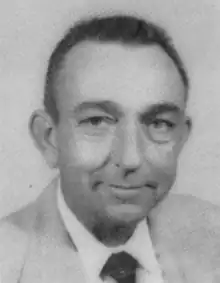A. Wynn Howell
A. Wynn Howell (born Albert Wynn Howell; March 24, 1912 – May 31, 1989)[1] was an architect with his own firm, A. Wynn Howell, in Lakeland, Florida from 1952 to 1965.[2] He became an architect via private study and a seven-year apprenticeship to three successive established architects in the central Florida area immediately after World War II.[2] He was a member of the American Institute of Architects (AIA) from 1954 to 1967 and in 1973.[3] He was vice-president of its Central Florida chapter during 1958–59 and president during 1960–61. He was director of the entire Florida Association of Architects during 1962–63.[2]
A. Wynn Howell | |
|---|---|
 Howell in 1960 | |
| Born | Albert Wynn Howell March 24, 1912 Elba, Alabama |
| Died | May 31, 1989 (aged 77) Kershaw, South Carolina |
| Occupation | Architect |
| Spouse |
Sara Ruth Mathews Howell
(m. 1937–1961) |
| Parents |
|
| Practice | A. Wynn Howell, Lakeland, Florida |
| Buildings |
|
His self-selected notable buildings,[2] all in central Florida, were Rochelle Junior and Senior High School, Lakeland (1955); Saint Agnes Episcopal Church, Sebring (1959); Saint Edward's Episcopal Church, Mount Dora (1959); Lincoln Avenue Elementary School, Lakeland (1960); Placid Tower,[4] Lake Placid (1960); and University Lutheran Church, Gainesville (1961).[2] The last building listed, University Lutheran Church, has been selected by Envision Heritage of the University of Florida for digital preservation.[5][6] In 1953, he proposed a design for the Citrus Tower in Clermont with two observation floors supported by a giant cylinder that visitors could walk up using an external spiral stairway – it was rejected.[7]
Howell was born in Elba, Alabama.[2] He retired and moved to Menlo Park, California in 1966.[8] He died in Kershaw, South Carolina[9] and is buried in Quaker Cemetery, Camden, South Carolina.[1]
References
- Traxler, Edward (2009), A. Wynn Howell, Find-A-Grave
- Howell, A. Wynn (1962), "Howell, A(lbert) Wynn" (PDF), American Architects Directory, Biographical Section, p. 329, Howell's short autobiography.
- Hadley, Nancy (2019), AIA Historical Directory of American Archirects
- Hinder, Kimberly D. (2006), Stager, Claudette; Carver, Martha (eds.), "Florida's Earliest Tourist Towers: Placid Tower", Looking beyond the highway: Dixie roads and culture, Knoxville: University of Tennessee Press, ISBN 9781572334670,
A. Wynne Howell, [sic] the Lakeland-based architect.
"Search in this book" for "A. Wynne Howell" (in quotes). - Envision Heritage (2016), University Lutheran Church in Gainesville, Florida, YouTube
- College of Design, Construction and Planning (2019), Envision Heritage, University of Florida
- Bloodsworth, Doris (2010), Clermont, Images of America, Arcadia, p. 88, ISBN 978-0-7385-8586-4.
Bloodsworth claims (p. 88) "A. Wynne Howell [sic] of Lakeland, an understudy of Frank Lloyd Wright," but Howell does not mention Wright in his short autobiography.[2] - Florida Association of the American Institute of Architects (March 1966), "1966 Membership Roster", Florida Architect: 25
- "United States Social Security Death Index", FamilySearch.org, A Wynn W Howell (registration required)